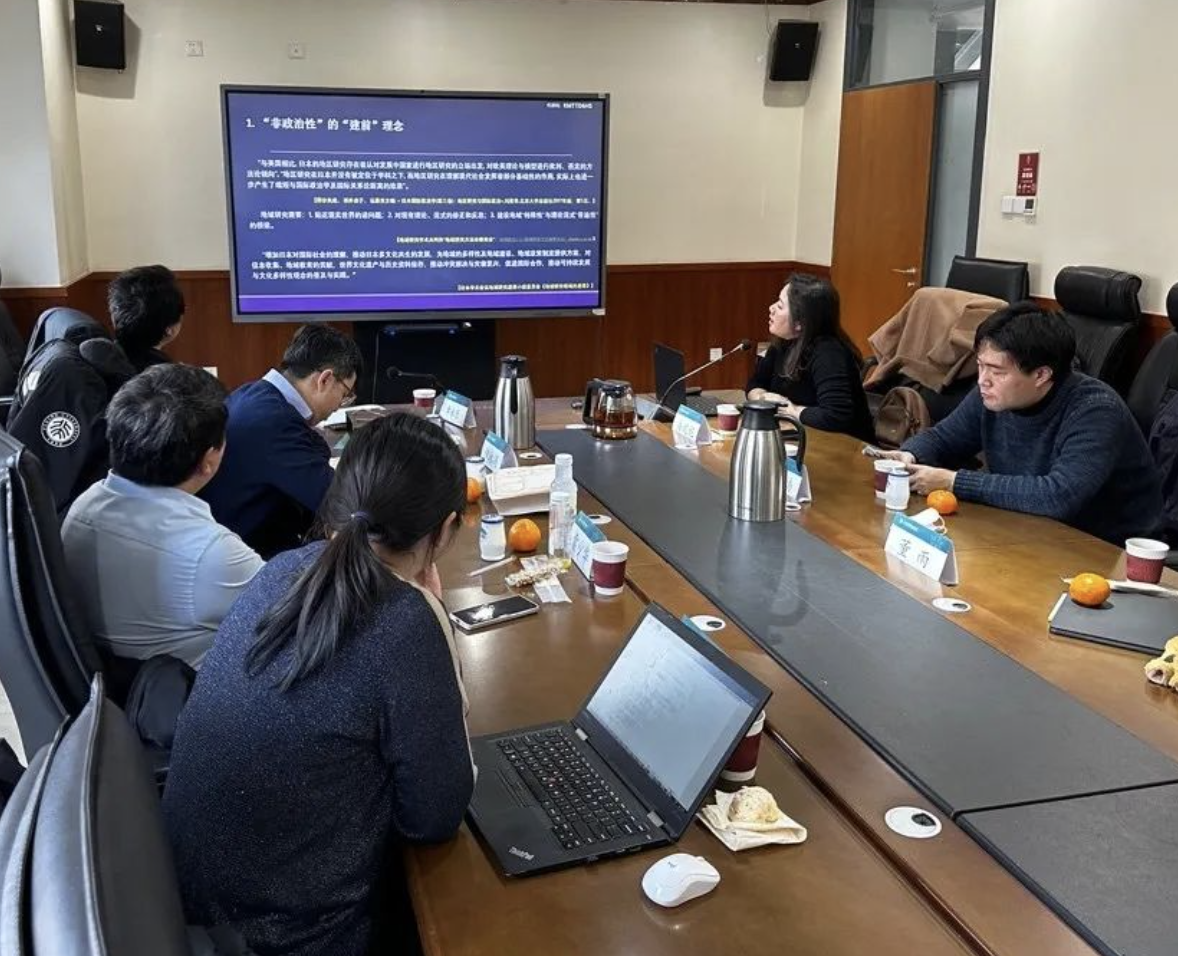The 8th lecture of the seminar series “Autonomous Knowledge System Construction and New Perspectives of Area Studies” of the Institute of Area Studies, Peking University (PKUIAS), entitled “Post-War Politics and the Depoliticization of Regional Studies in Japan,” was held on December 5, 2023. The seminar was delivered by Pan Nini, associate professor of East China Normal University, and moderated by Zhang Yongle, deputy director of PKUIAS. Participating experts and scholars included Gui Yongtao and Lei Shaohua, both associate professors from PKU’s School of International Studies.
At the beginning of the lecture, Pan Nini analyzed the background of the emphasis on “non-politics” in Japanese area studies from the 1960s to the 1990s and summarized the characteristics of the methodology of Japanese area studies in this period. In the post-war period, Japanese area studies faced many challenges in the process of reconstruction, such as the reflection on the national imperialist research practice exemplified by the survey department of the South Manchuria Railway (SMR) Company, the criticism of the political ideology of post-war liberal arts research, and the questioning of the American capital’s involvement in the establishment of area studies institutions. Influenced by the US foreign strategy and the Japan-US alliance, the Japanese government needed to revitalize area studies. However, with the lesson from the war not far in the past, Japanese academia did not want geographical studies to become a tool of war again. Thus, Japan chose to avoid politics and emphasized the “non-political” nature of area studies. The approach to area studies in this period was characterized by a shift in position that focused on understanding the facts, full protection of scholars’ freedom of research, and an emphasis on basic disciplinary orientation.
Then, Pan Nini, taking into account the political situation in Japan in the 1990s, reviewed the bottlenecks faced by “non-political” area studies in Japan in that period and their attempts to break the bottlenecks. In the 1990s, Japan saw stable democratic politics, good economic development, soaring national self-confidence, and the public nature of realpolitik at an all-time high, and people began to expect that academic research could contribute to social progress and national development. However, the development of area studies in Japan did not meet expectations, and it has faced criticisms such as lack of effective output, rigidity of topics, inaccurate positioning, and academic closure. In response, Japanese scholars have attempted to re-conceptualize “depoliticization” to evolve from avoiding politics to transcending politics, and to promote the development of area studies from focusing on the economic development of a single region to focusing on global non-traditional security issues. The Japanese government also actively followed up on the reform of the academic community by promoting the institutionalization of cooperation between the government and the private sector to align the agenda of area studies with the needs and strengths of the country.
Pan Nini argued that current Japanese politics is characterized by a low level of publicity, a serious rightward shift in politics, and a conscious effort by the political class to direct the agenda setting of the academia. This has led to a controversy among researchers around the understanding of “depoliticization.”: whether to interpret the Japanese government’s orientation from the perspective of “depoliticization” or to emphasize the “non-political” “social center”? The underlying political attitude of the researchers was also reflected behind the divergence.
In the discussion session, participants further explored the situation of area studies in Japan and the future agenda for building area studies in China. Zhang Yongle proposed to think about the concept of “politicalness” and how Japan’s post-war transformation has been implemented in area studies. Gui Yongtao suggested that Japan’s historical experience in responding to the legitimacy crisis of area studies could be a reference for the construction of China’s area studies. Lei Shaohua discussed the state of the discipline and research reflected by Japanese scholars’ presence in contemporary international conferences. Zhu Xiaoqi, a lecturer at the School of International Studies, Renmin University of China, argued that although being “non-political” is the main feature of Japanese area studies, it is still influenced by politics in terms of scholars’ perception, research funds, and research impact. Dong Yu, a postdoctoral fellow at the Department of History, PKU, commented on the position of history and the discipline of history in Japanese area studies.



